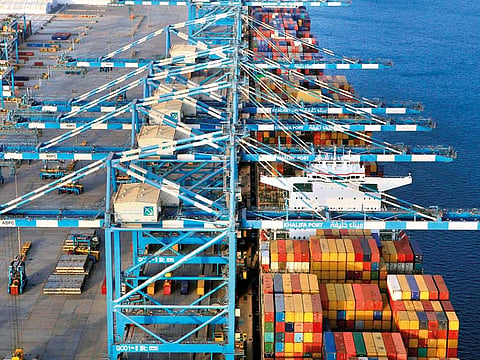The future of freight
Ports in the UAE have continued to evolve to keep up with economic, political, demographic and technological trends. We look at the advancements turning the tide

When it comes to the economic well-being of a nation, location is everything they say, and for the UAE this has become especially true. The country’s geographical position coupled with infrastructure advances over recent decades has made it an ideal supply and redistribution gateway, offering huge growth potential for the operating logistics players.
Because of this, UAE ports have emerged as important trans-shipment points in the Europe-Asia trade lane and multimodal logistics hubs that cater to the needs of increasing trade within the region.
Logistics in the GCC is a $50-billion (Dh184 billion) business and the UAE ranks as the seventh busiest trans-shipment port in the world. To handle such volume the infrastructure needs to be first rate, and because of the continuous importance of trade and its geographic advantages, there is now a world-class ports infrastructure spread across UAE.
Abu Dhabi Ports is a vital part of the UAE capital’s economy, owning and operating 11 ports and managing more than 55,000 vessel calls each year.
Shipshape sector
The recently concluded Abu Dhabi International Boat Show was testimony to the booming business being done in the sector. A good example is the contract signed at the event between Damen Shipyards Group and Abu Dhabi Ports and its subsidiary Abu Dhabi Marine Services (Safeen) for the supply of two new Damen ASD tug boats. The ASD Tugs 2411 will bring valuable additional vessel handling capabilities to the group.
The tugs will join the 12 already in service with Safeen — the fleet-operating subsidiary of Abu Dhabi Ports responsible for piloting, mooring, vessel handing and towage — and will bring a new level of capability. In particular, they will be supporting vessel movements at Khalifa Port’s two container terminals managed by ADT/MSC and COSCO Shipping Port as well as EGA’s berth for Bauxite shipped to its smelter in Al Taweelah.
“The extension of our fleet at Khalifa Port with two high-service tug boats is a remarkable milestone for Safeen to address customers’ needs professionally as well as for Khalifa Port, which will be the first port in the GCC able to receive the largest container and shipping vessels in the world,” says Captain Adil Ahmed Banihammad, acting chief marine services officer at Abu Dhabi Marine Services — Safeen. The average size of a vessel has grown by 65 per cent due to economies of scale. Industry leaders are aware of the importance of equipping UAE ports with the right equipment and logistics to adapt to changing demands.
RAK Ports’ Saqr Port has two new deep-water berths for larger vessels
When it comes to Ras Al Khaimah, a significant challenge has been recovering from the Qatar embargo during 2017. “It has taken almost a full year to regain volumes as to what they were previously,” explains Captain Clifford Brand, CEO of RAK Ports. However, things are now on the up due to new investment and the completion of large-scale engineering projects.
Seeking new shores
“At Saqr Port we completed the first of two new deep-water berths capable of handling capsize vessels, so the port is able to handle larger vessels and improve on throughput,” says Brand.
“In addition, Saqr Port has invested in the latest bulk-handling equipment, which includes the largest mobile harbour cranes in the world. In the near future, the port will aim to become more efficient through further investment in mechanisation such as the latest ship-loaders and conveyors as well as covered storage from an environmental aspect.
“Again, for the RAK Ports group, increasing throughput [comes] by reaching markets further afield especially in Asia and beyond. In the coming years, we will need to intensify our completive edge as world ports compete with one another in a more global and competitive market.”
In Sharjah, Gulftainer is set to invest $3 million in a crucial road link between the emirate’s Saja’a Industrial Investment Park and three of the Sharjah’s major seaports. The UAE-based independent port operator said the new highway will connect the industrial park with Port Khalid, Hamriyah Port, and Khorfakkan Port in Sharjah through Emirates Road (E611). The investment aligns with its objective to play a key role in driving the emirate’s economy. Work on the link has already begun.
Atif Rafiq, CEO and founder of Qafila, the UAE’s first digital shipping platform says that while the strategic vision has always been on point when it comes to investment in infrastructure operations and logistics services around UAE ports, things can be improved.
“Digital is the future for logistics and port management. Enhancing customer experience and digitization is the key to the future of trade and logistics,” says Rafiq, who also works with the logistics company Al Sharqi. “In a region where governments such as the UAE is pushing for Industry 4.0, AI and other smart initiatives across the country, saving time and money is important for success and growth of any business.”
Sign up for the Daily Briefing
Get the latest news and updates straight to your inbox



